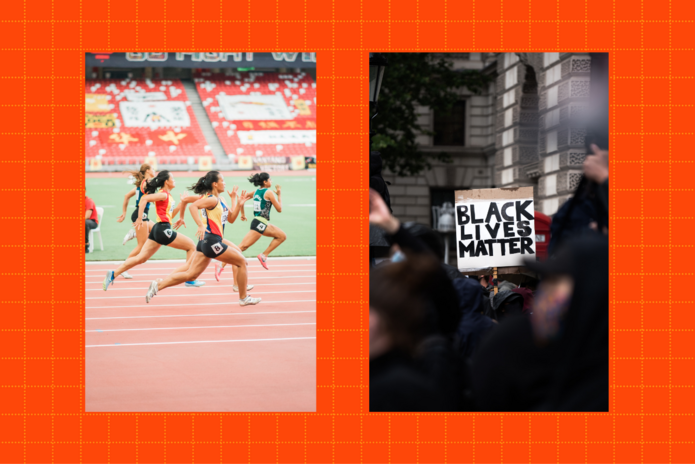In 2021, athletes will be able to exercise their rights to protest at the Olympics, and several countries have pledged to take a knee before the games. But the International Olympic Committee (IOC) has rules set in place about where and how athletes can make a statement, making it difficult for them to spread awareness about the things that matter most. According to the IOC, physical forms of protest at the Olympics, such as raising a fist and kneeling, are only permitted during introductions – not during the competition or on the podium. Even during those permitted times, if any form of protest is seen as disruptive or targeted towards specific entities, athletes may face disciplinary action – not to mention the risk of public shame or threats, mirroring the ones Tommie Smith and John Carlos received in 1968 after raising their fists on the podium as a symbol of Black liberation.
In 2021, Black Lives Matter apparel was also banned by the IOC because Olympic organizers believed it showcased politically charged viewpoints. While the Olympic Charter does ban political, religious and racial propaganda in an effort to focus on sports, you can’t equate Black Lives Matter to propaganda, which is defined as “the spreading of ideas, information, or rumor for the purpose of helping or injuring an institution, a cause, or a person.” Propaganda has long been used to sway people to a certain side politically in the form of posters and other mediums, using rather extravagant advertising tactics. When it comes to the Black Lives Matter movement, the people advocating are simply trying to showcase its importance by bringing awareness to it. Just a few months ago, Sunny Hostin, a journalist and lawyer who co-hosts The View, pointed out that this a civil rights movement that we’re living through in real time. “I’m surprised that this committee took the time to point that out, and are telling athletes ‘just shut up and play,’” she said.
A movement that focuses on acknowledging the oppression within society ought to have a place in every part of society, especially one with both a history of racism, sexism and more and ongoing examples, including sprinter Sha’Carri Richardson’s 30-day ban after testing positive for marijuana. Well-deserved backlash demanded that she be able to participate in the 100-meter run, which fell within her ban, but she was even left off of the relay roster, an event she was technically eligible to compete in.
Denying people the ability to express their passion towards a positive movement puts nothing but roadblocks in between humanity and success.
This ban is reminiscent of when Starbucks banned employees from wearing Black Lives Matter shirts because they didn’t want to “amplify divisiveness,” but sometimes amplifying divisiveness is the only way to allow people to clearly understand the many different perspectives Americans have, therefor generating meaningful conversations. Remember when former NFL quarterback Colin Kaepernick chose to kneel during the national anthem in 2016? Even though lots of people didn’t agree with him kneeling during the anthem, Kaepernick opened up a conversation about patriotism and what it represents. What businesses don’t seem to understand – and yes, at its core the Olympics is a business – is that by not being as outwardly vocal about these issues as possible, they’re the ones who are depriving the country (and the world) of having much-needed conversations.
Rather than sitting idly by, Olympic organizers should be demanding that spectators pay attention to help diminish the reality that we still live in a world where everyone is not treated equally. Denying people the ability to express their passion towards a positive movement puts nothing but roadblocks in between humanity and success. This year, the Olympics will host around 11,000 athletes, from 206 countries around the world. It seems unfair that a business like Starbucks would rather their employees – or the Olympics, their athletes – stay silent and neutral instead of spotlighting important problems, especially when so many eyes will be on them between competition streams and athlete’s personal social channels. Why are we wasting such a large avenue to raise awareness through?
I can’t help but be reminded of those anti-bullying videos that were shown in elementary school. Do you remember when teachers would say, “Don’t be a bystander, because you’re just as bad as the bully for not doing anything”? When it comes to the Olympics, trying to discourage these protests enables a “bystander” attitude. There are a myriad of opportunities at this event to stand up for problems that need attention, and not just in America. For example, there’s a water shortage in Palestine. Extreme poverty issues in Madagascar threaten its rich biodiversity. By preventing peaceful demonstrators from speaking up about the changes that need to be made, the IOC is ultimately enabling all of us to maintain bystander attitude, blocking the attention required to make a difference.
If the 2016 Rio Olympic ratings are anything to go by (they brought in 27.5 million viewers across television daily), the world’s eyes are on these athletes. Since spectators aren’t allowed at the games, the number of at-home viewers is likely to increase. Speaking up, even symbolically – like through the shirt one chooses to wear – is something that should be prioritized – especially considering how much it can impact people around the world. The Olympics may be a competition, but it also brings people from all over together in ways that not much else can. Every country showcases their patriotism by displaying their flag and playing their anthems, but if the American flag can be flown, so should the Black Lives Matter flag, or a banner calling for justice where it’s needed. If countries are given the opportunity to showcase the good, it’s only fair for them to use such a large platform to shed light on the things that need to change, too.


